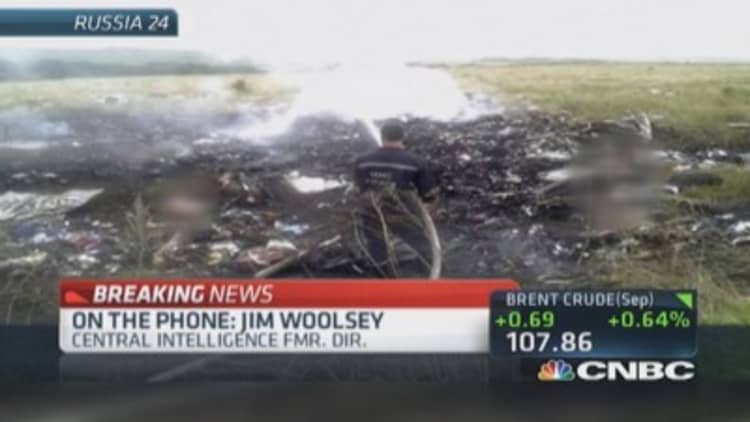With all eyes on the Malaysia Airlines passenger plane crash in Ukraine—a possible act of terrorism that has caused market unrest—many investors may wonder what, if anything, they should do.
After all, renewed fears of problems in the region between Russia and Ukraine appeared Thursday to push U.S. stocks down, oil, gold and wheat up, and weakened the Russian ruble versus the U.S. dollar.
Read MoreMarket's reaction to Malaysia jet crash could be short-lived
Those moving markets mean professional traders are trying to make money on the news. Some probably have. But should the average investor react to the turmoil with their own savings?
Wealth management experts have a clear answer: no.
"I can't imagine a plane being shot down in Ukraine is a reason to make a decision on a long-term investment," said Ivory Johnson, founder of $25 million Delancey Wealth Management in Washington, D.C. "I definitely wouldn't make a knee-jerk reaction."
Read MoreMalaysian president launching immediate investigation into crashed plane
"Geopolitical events generally have a short-term impact that are very difficult to trade around," said Anthony Valeri, a market strategist at LPL Financial, an independent broker-dealer with $415 billion in overall assets.
If the crash causes an extended market decline, Valeri said that more "nimble" investors might use the opportunity to buy, given the relative strength of the economy. But he generally cautioned against trading the news.

Those views are backed up by academic research. A 2004 study by academics at the University of California at Berkeley, National Chengchi University in Taipei, Taiwan, and others found that more than 8 out of 10 day traders lose money in the typical six-month period.
The U.S. Securities and Exchange Commission also cautions average investors from day trading, which is essentially what people would be doing by reacting to the Ukraine news.
"While day trading is neither illegal nor is it unethical, it can be highly risky. Most individual investors do not have the wealth, the time, or the temperament to make money and to sustain the devastating losses that day trading can bring," the SEC warns on its website.
"Day traders should only risk money they can afford to lose," the SEC added. "They should never use money they will need for daily living expenses, retirement, take out a second mortgage, or use their student loan money for day trading."
Read MoreMalaysian air crash amplifies move to US Treasurys
Regardless, market observers do not see major ramifications from the Ukraine news.
"While we have identified geopolitical risks to be one of the two major risks on our horizon (the other being an unexpected turn for the worse in the U.S. economy), it remains just that—a risk case," said Bob Browne, chief investment officer for Northern Trust, which manages $924 billion in assets. "The base case is that these events will continue to be localized and have minimum impact on the global economy and major financial markets."
"There are no real economic or market implications to the plane crash today," added Scott Clemons, chief investment strategist at Brown Brothers Harriman's $28 billion private bank. "Investors have shrugged off developments in Ukraine since they started unfolding earlier this year, and I don't see this incident changing that perception."
Investment advisor Johnson also said this was no major economic event, which would worry him. "Now if it's something that could have a systemic effect ... that's different," he said. "This isn't going to cause the dominoes to start to fall over."
Read MoreUkraine air space still open, but airlines avoid
Johnson added that investors should be more worried about corporate fundamentals:
"I'm more concerned about who has better profit margins than I am who can lose money because of a plane crash in Ukraine," he said.
—By CNBC's Lawrence Delevingne






